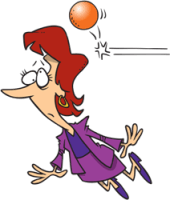Verbos principales, verbos auxiliares y
verbos compuestos
Las oraciones en inglés pueden contener verbos principales, verbos auxiliares y verbos compuestos.
Click Here for Step-by-Step Rules, Stories and Exercises to Practice All English Tenses
Vamos a repasar cada grupo.
Verbos auxiliares
Los verbos auxiliares son verbos que se usan con otro verbo (llamado el verbo principal de la oración) para expresar la acción o el
estado. verbo principal + verbo auxiliar = idea completa
Los verbos auxiliares más comunes son:
be, am, is, are, was, were, do, did, have, has, had.
Are
singing
(Están cantando)

El verbo principal es "singing."
El verbo auxiliar es "are."
(Están cantando)

El verbo principal es "singing."
El verbo auxiliar es "are."
Oraciones con ejemplos (el verbo auxiliar está en negrita y el verbo principal está subrayado):
- They are jogging.
(Están corriendo.)
- She was sitting.
(Estaba sentada.)
- We were waiting for hours.
(Estuvimos esperando durante horas.)
- Is she sleeping?
(¿No está durmiendo?)
- He didn't know the answer.
(No sabía la respuesta.)
- We have gone a long way.
(Hemos ido muy lejos.)
- Has she received any of my letters?
(¿Ha recibido alguna de mis cartas?)
- Do you smoke?
(¿Fumas?)
- Will she help?
(¿Ayudará?)
Haz clic aquí para aprender más sobre los verbos auxiliares.
Verbos compuestos
verbo compuesto = verbo auxiliar + verbo principal.Ejemplos:
was playing, has eaten, doesn't want.
(estaba jugando, ha comido, no quiere)
She will
fall.
(Ella caerá.)

"Will fall" es un verbo compuesto.
(Ella caerá.)

"Will fall" es un verbo compuesto.
Oraciones con ejemplos:
- They were discussing their future.
(Estaban hablando de su futuro.) - He didn't tell us the truth.
(No nos contó la verdad.) - I have finished my homework.
(He terminado mi tarea.) - She will meet us there.
(Nos verá allí.)
Get Updates, Special Offers, and English Resources
Download your FREE GIFT (the first two chapters of
English Short Stories Book and Workbook)
as soon as you join!

By submitting your email, you consent to receiving updates and newsletters from us and to the sharing of your personal data with third parties for the purposes of sending you communications. We will not spam you. You can unsubscribe at any time. For more information, please see our privacy policy.
Volver de
Verbos principales, verbos auxiliares
y verbos compuestos a Aprender a escribir en
inglés
Página principal de Really Learn English





